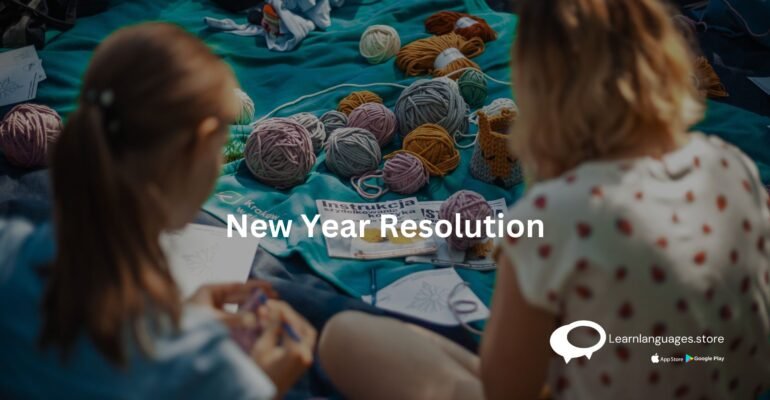New Year Resolution–Learn a Language
New Year Resolution–Learn a Language
Yes, you always set New Year’s resolutions but only keep them until February. So what?
One survey found that approximately 50% of resolution-makers keep theirs after six months.
New year resolve makers are 10 times more likely to achieve their goals than non-resolution makers.
Do not hesitate to make New Year’s language resolutions. Imagine ordering a stroopwafel in Dutch while wandering Amsterdam’s canals in 2021. Japanese directions to Kyoto-Osaka rail.
Yes, Covid may prevent you from traveling much. but by summer we may be semi-normal. How about learning a new language while you are stuck at home?
In this essay, I want to inspire you to start your New Year’s language resolutions, give you some recommendations on making them SMART objectives you can achieve, and then give you some advise on how to keep to them.
Inspire Your New Year’s Language Resolutions
“What is a foreign accent? It’s brave.” —Amy Chua
Learning a new language can boost your love life, career, and intelligence.
But thinking about all the destinations I could travel to and the different people I could meet inspires me to learn a language.
Trouble visualizing?
Watch videos of language learners speaking. Polyglot films make me want to learn 10 languages.
Use SMART to Keep Your New Year’s Language Resolutions!
Excited for your new language?
Then resolve to study it in a year. SMART language goals—specific, measurable, attainable, relevant, and time-bound—work best.
SMART Goals

Exact
Define your goal. Choose specific abilities to study instead than merely resolving to “speak French” in the New Year. Your objectives may be:
French greetings
Order a café croissant in French.
Communicate with new friends.
Understand everyone at a French party.
Present a complicated topic professionally.These are distinct, unique purposes.
Specific goals help you focus your learning and realize when you have reached them.
Measurable
Making goals measurable has two benefits.
It motivates you. Language learning is time-consuming. And slowly. That means you often work hard without seeing results.
Measure your language learning progress to discover how much you are improving and stay motivated.
Measure your progress to determine when you have reached your goal.
“Learn to speak Ojibwe fluently” is impossible. Always learn more. If you want to “speak Ojibwe at a C1 level,” you will succeed when you meet the conditions.
Measurable goals help you stay motivated and visualize the end.
Reachable
Set achievable goals. You will quit if it is hard. Find something you can achieve with effort.
Relevant
Be careful to learn a language.
You want to speak Russian to your in-laws. Do you care enough to work?
Choosing meaningful goals will keep you motivated.
Timed
Time yourself.
Remember how writing that school essay the night before was easiest? Deadlines stress us.
Language learning deadlines exert the same pressure. Setting a deadline will motivate you.
Combining It
That yields SMART goals.
My SMART goals for learning Brazilian Portuguese are:
by June 2021.
by June 2021.
Read a 200-plus-page novel by December 2021.
By December 2021, write B2 about daily life.Each goal has a deadline. They are worded so I can track my progress and know when I have achieved them. I can do them all. I value them, so they are relevant.
How to Keep New Year’s Language Resolutions
You picked your resolutions. Can you follow them? Research-based tips for keeping resolutions.
Prioritize Resolutions
The “relevant” aspect of SMART goals is worth repeating: you will only keep your resolutions if they are significant to you.
It is okay if language study does not interest you! Language learning is not for everyone.
If you have always wanted to speak another language, this is your year.
Modify One Thing
Small steps are the best method to achieve huge goals.
Studying a language for eight hours a day is unlikely to work. Overwork can lead to burnout.
Begin slowly. Commit to one or two activities. Then add another. Then another.
Building slowly helps you persevere.
Form Habits
Habits simplify everything. Habits are automatic. Pair language learning with something you already do to form a habit.
I like listening to a Portuguese podcast while cooking or washing dishes. I turn to the podcast before starting dinner. It means I listen to my podcast more often.
Create other habits:
While commuting to work, practice Pimsleur.
On the treadmill, listen to a podcast in your target language.
Netflix in your desired language instead of English.
Cook with your target language recipes.
Read the morning news in your target language while drinking coffee.You will make genuine progress in language learning when you include your favorite activities.
Your Resolution
Publicly committing helps us follow through. Tell your partner, family, and friends your aim. Request accountability.
Better yet, agree. Find a friend—or partner—who wants to learn your language. Group projects are more fun and easier to complete.
Get it. Recover if Dropped
It is common to get busy and neglect hobbies. Consider it a chance to try again rather than a failure.
It is okay to “fail” when learning a language. Avoid stress.
Start again when ready. You can re-resolve any time of year.
Finally, Do not Do Everything.

New Year’s resolutions are sometimes misinterpreted as failures if not kept.
One perspective. Another: trying harder brings you closer to your objective.
As said in the beginning of this essay, resolution-makers are 10 times more likely to achieve their goals than non-resolution-makers. Thinking about and working toward your goals increases your chances of success.
Language resolutions are like that. Even if you just manage two hours a week, that is improvement.
Learn Languages Store
Vashi,
Email: services@learnlanguages.store










